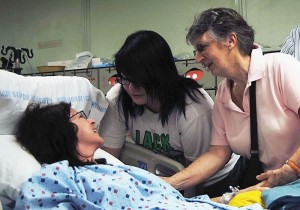 By Nina Sainath, Class of 2011
By Nina Sainath, Class of 2011
Faculty Peer Reviewed
According to the latest US Census Bureau report analyzing the use of languages in the United States, over 20% of Americans speak a language other than English at home. Of this population, greater than 24% report that they do not speak English well or do not speak English at all.[1] With a United States population of more than 300 million, this makes over 70 million people with limited English proficiency.
Verbal communication is the primary tool by which doctors are able to understand patients’ symptoms and their beliefs about health and illness. It is how doctors educate a patient about the necessity of adherence to medications or alterations in lifestyle. Communication itself can be therapeutic. Consequently, the large number of patients with limited English proficiency in the United States makes the role of the medical interpreter indispensable. Several studies have shown that the use of medical interpreters improves patient satisfaction, increases delivery of preventive health measures, and improves patient understanding of both disease and treatment.[2,3,4]
Medical interpretation is performed in several ways: by a professional interpreter, a bilingual physician, or an ad hoc interpreter. The medical translator’s interpretation should not impair the diagnostic ability of the physician or the safety of the patient, nor should opinion color the tone or taint the content of the interpretation. The bottom line is that patient care should not be compromised. An untrained ad hoc interpreter, usually a family member or friend of the patient, can be a knight in shining armor in the midst of a long day. When a patient with limited English proficiency presents for medical care, many physicians reflexively reach for the time-consuming interpreter phone; an ad hoc interpreter can restore several potential lost minutes.
The use of ad hoc interpreters is quite common. In a study involving 157 US academic health centers and over 3000 residents, 84% noted that they use ad hoc interpretation by adult family members and friends of the patient.[5]
In a meta-analysis, Karliner and colleagues reviewed the literature on professional interpreters compared to ad hoc interpreters and concluded that professional interpreters improve the quality of overall clinical care.[2] This may be due to fewer interpretation errors and improved patient satisfaction.
A 2003 study by Flores and colleagues compared the number of translation errors made by professional interpreters compared to ad hoc interpreters. Errors included omission, substitution, and addition of information, as well as editorialization and false fluency. The authors found that ad hoc interpreters had a higher incidence of false fluency, or the incorrect use of a word or phrase. Furthermore, ad hoc interpreters were more likely to make errors with significant clinical consequences, such as failure to report allergies or misinformation about treatment duration.[6] Another study by Prince and Nelson studied the error rate in a small group of residents who received 45 hours of Spanish training.[7] These ad hoc interpreters had major errors in patient understanding in 14% of their patient interactions.
There is also evidence suggesting that patient satisfaction increases with the use of professional interpreters. A qualitative study conducted by Ngo-Metzger and colleagues suggested that a sample population of Chinese and Vietnamese Americans preferred professional interpreters to ad hoc interpreters.[8] Additional evidence shows that among parents with limited English proficiency who brought their children to a pediatric emergency room, there was greater overall satisfaction and a higher perceived quality of care with the use of hospital-trained interpreters or telephone interpreters compared to ad hoc interpreters.[9]
In clinical environments where time is of the essence, it is altogether too common to rely on family members and untrained individuals for interpretation. Ad hoc interpreters are convenient for the physician and they allow the patient interaction to feel more personal. There is, however, evidence to suggest that this may not be an appropriate method of interpretation, as it is associated with more serious clinical errors and decreased overall patient satisfaction. It may be time to politely decline use of the family interpreter and pick up the phone again.
Nina Sainath is a 4th year medical student at NYU School of Medicine
Peer reviewed by Andrew Adler, MD, associate professor of medicine and clinical associate dean, Downstate Medical School
Image courtesy of Wikimedia Commons
References:
1. U.S. Census Bureau. American Community Survey Reports. Language use in the United States: 2007. Available at: http://www.census.gov/prod/2010pubs/acs-12.pdf. Accessed June 18, 2010.
2. Karliner LS, Jacobs EA, Chen AH, Mutha S. Do professional interpreters improve clinical care for patients with limited English proficiency? A systematic review of the literature. Health Serv Res. 2007;42(2):727-754.
3. Baker DW, Parker RM, Williams MV, Coates WC, Pitkin K. Use and effectiveness of interpreters in an emergency department. JAMA. 1996;275(10):783-788.
4. Jacobs EA, Lauderdale DS, Meltzer D, Shorey JM, Levinson W, Thisted RA. Impact of interpreter services on delivery of health care to limited-English-proficient patients. J Gen Intern Med. 2001;16(7):468-474.
5. Lee KC, Winickoff JP, Kim MK, et al. Resident physicians’ use of professional and nonprofessional interpreters: a national survey. JAMA. 2006;296(9):1050-1053.
6. Flores G, Laws MB, Mayo SJ, et al. Errors in medical interpretation and their potential clinical consequences in pediatric encounters. Pediatrics. 2003;111(1):6-14.
7. Prince D, Nelson M. Teaching Spanish to emergency medicine residents. Acad Emerg Med. 1995;2(1):32-37. http://onlinelibrary.wiley.com/doi/10.1111/j.1553-2712.1995.tb03076.x/abstract
8. Linguistic and cultural barriers to care. J Gen Intern Med. 2003;18(1):44-52.
9. Garcia EA, Roy LC, Okada PJ, Perkins SD, Wiebe RA. A comparison of the influence of hospital-trained, ad hoc, and telephone interpreters on perceived satisfaction of limited English-proficient parents presenting to a pediatric emergency department. Pediatr Emerg Care. 2004;20(6):373-378. http://www.ncbi.nlm.nih.gov/pubmed/15179145
